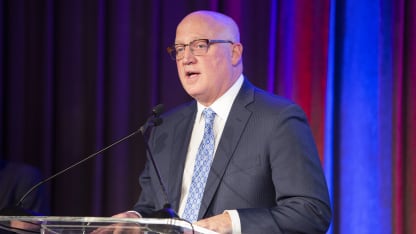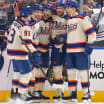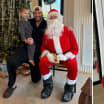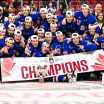Bill Daly remains focused on this season, on ensuring everyone in the Secure Zones in the hub cities of Toronto and Edmonton stays safe and healthy so the Stanley Cup Playoffs can continue and eventually conclude with a Stanley Cup champion.
NHL playoffs in hub cities have Deputy Commissioner 'very encouraged'
Daly discusses play in Toronto, Edmonton, start of next season in Q&A with NHL.com

© Geoffrey Hauschild/Getty Images
But the NHL Deputy Commissioner is also focused on next season, on both when it could begin and what it could look like considering the impact the coronavirus continues to have in North America.
Next season is tentatively scheduled to start Dec. 1, and Daly addressed that date, the NHL's flexibility to move it back, the potential for playing with fans in the arenas and much more in the following Q&A he did with NHL.com on Monday.
The playoffs themselves, the bubbles, is it all meeting expectations, exceeding expectations so far? What is the thought process from you on how it's gone?
"I think we're really pleased with our experience to this point in time. Obviously, that's driven first and foremost by the fact that we've been able to stay incredibly healthy. We're releasing the results of our fourth week in the bubble this morning, and the number is 4,644 tests of traveling parties for both Edmonton and Toronto and we have yet to have a single positive. That's 4,644 tests this past week. The number is 24,542 tests administered to date, all of them have come back negative. So, I'm very, very pleased that the protocol procedures we put together seem to be working. I think the tournament has been very successful. Obviously, it's a unique environment for the players and for the clubs, but I think everybody has embraced the opportunity. I think the hockey has been incredibly good for players, a large number of which were forced to take several months off from hockey training. So, to this point, very, very pleased and we understand we still have a little more than a month to go, but so far I'm very encouraged."
What has the feedback been like that you've gotten from the NHL Players' Association about how it's gone and any wants or needs that the players have? How has communication been between the NHLPA and the NHL?
"The communication continues to be regular and frequent. The NHLPA have had staff members inside each of the bubbles where they've heard concerns or things that they might be able to address, they certainly are in touch with us to discuss those. I think our events people who constructed the two bubbles have been incredible. What they've accomplished in a relatively short period of time to accomplish it really borders on the extraordinary or is extraordinary. They are working hard every day to improve the experience to include activities inside the bubble because it does become a fairly monotonous existence. They're working with the clubs, working with the players, working with the players' association to do that. It continues to be a very strong line of communication with the players' association. We understand what the concerns are and we try to address them the best we can."
Inside the Bubble: Episode 1
What is the status of families entering the bubble for the conference finals in Edmonton?
"We've sent a survey out to the clubs and we have responses from each of the eight clubs who remain in the playoffs. We put together a protocol document for what families in the bubble would look like and what procedures would be employed to integrate them into the bubble, the timing of all that, precautions and testing and the like. We intend to have a conversation both with Alberta Health Services and the Public Health Agency of Canada likely this week to see whether family integration can be accommodated. So I don't have a certain answer at this point, but we hope that our track record so far of conducting a safe bubble would generate some comfort and enthusiasm about us allowing families to enter the bubble."
What impact is the games being played having on the business? How significant is it?
"For the most part it's a preservation of revenue that has already been generated particularly with respect to our national and international rights [broadcast] agreements, but it's significant revenue for sure. There has been individual sponsorships and advertising sold, and that generates some incremental revenue. But I think more than on the revenue side, I think it's important for the business for a whole separate reason, which is we thought it was very, very important to be able to finish the [2019-20] season, to award the Stanley Cup, to not have a season that couldn't be finished due to the pandemic. That was the primary objective, which is to create business continuity and certainly to service our fans who certainly would have missed having a 2020 Stanley Cup champion and 2020 Stanley Cup Playoff tournament to watch and to follow. We thought it was important from a League perspective for our business that we be able to complete the 2019-20 season. We certainly are hopeful we'll get to do that."
When could next season begin, and what's the thought process there? I saw NBA commissioner Adam Silver say Dec. 1 for the NBA might be too soon. What is the general thought process regarding next season for the NHL?
"We've been fairly consistent from the start with where we stood with respect to next season. In our [NHL/NHLPA Memorandum of Understanding] we have a tentative start date also of Dec. 1, but the Commissioner (Gary Bettman) has repeatedly said over time that we have some flexibility to push that date, that our objective is to be able to play games with fans in our buildings to the extent that's possible, and to the great extent it's possible. That certainly gives us flexibility to move back the start of our regular season, but we also have the benefit of being able to observe what happens over the next several weeks and months with respect to the fall sports and college sports and European leagues, how everything kind of shakes out around the world, really, in terms of live sporting events and how they're conducted. We don't have to make that decision today, similar to other decisions we make along the way in this process. We want to inform ourselves to the greatest extent possible before making definitive judgments and decisions on things that don't need to be decided today. We'll use all those information points, all those data points to make those decisions at an appropriate time."
See how the hub cities practice facilities operate
There have been some NFL teams talking about filling about 20 percent of the building when their games begin. Is that a possibility that the NHL is looking at for next season, to not fill the building but have a certain percentage of the building occupied with fans, or is that too premature to look at now because we're still in the bubbles trying to finish this season?
"I wouldn't say it's being actually discussed, but I think it's being recognized that it's certainly a possibility. We would love to be in a position where we could open on Dec. 1 to full buildings in every one of our markets. That may or may not be possible and we don't control that, so you have to adjust to that reality. That adjustment could take a variety of forms. It could be pushing back the start of the season until that might be possible, or it might be opening to partial buildings in either all the markets or a portion of the markets. We recognize there's not a lot of certainty with respect to what this looks like yet, and there may not be for some period of time. We're going to have to remain flexible and we're going to have to make the best decisions we can at the time we have to make them."
You mention all or part of the markets, is there talk about pods or even bubbles like what is happening now? Is that realistic to, for example, take a division and play the schedule in one or two markets to minimize exposure?
"I don't want to rule out anything because I think there are so many alternatives and possibilities and ways this might play out. I can't tell you we've thought necessarily about a divisional bubble. I don't think our current format for bubbles would work for the regular season, particularly because our objective is to play a full season and I'm not sure how we do that in the format we're currently utilizing. It's already a significant amount of time just to complete our playoffs in that type of bubble format. I don't think it's going to look like what we're currently doing, but could it be a variation of what we're currently doing. I wouldn't rule that out any more than I would rule out any number of other alternatives."
What happens with the major events like the Winter Classic, the Stadium Series, the All-Star Game? Are those back-burner items now until everything else gets figured out? How do those items work within the framework of what is possible?
"I'm not sure I'd call them back burner. I would call them part and parcel of the decisions we need to make. When we know what next season is going to look like and what format we're going to adopt and how it's going to evolve and play out, we'll be in a better position to make the decisions with respect to the tentpole events. For better or for worse, that's not today's decision."
How has all this affected, positively or negatively, the NHL's international business understanding that there won't be games overseas next season? Has it continued on as normal as possible?
"That's a relative measure, right, as normal as possible? I'd say yes. I mean, obviously it's been impacted like our domestic business has been impacted. Do I think it'll have an undue impact on our international business? No, I don't. Do I think we continue to be bullish on growing our sports, our footprint and our visibility internationally? Absolutely. We're going to be anxious to see how the European leagues come back online this coming fall, some in a couple weeks from now. I think the [Kontinental Hockey League] is scheduled to start Sept. 2. We'll be anxious to see how that all plays out. We'll be able to make decisions with respect to our international business strategy, things we want to accomplish as part of that mosaic as far as how it plays out. I think our international business has been impacted the same way our domestic and North American business has been impacted, but I'm not pessimistic at all about its future."
Required to fulfill a provision in the NHL/NHLPA Collective Bargaining Agreement to go to the Olympics in 2022 and 2026 is an agreement with the International Olympic Committee and the International Ice Hockey Federation too. Have there been any conversations with the IOC and IIHF regarding those agreements, or is that still premature?
"We haven't had any further discussion on international tournaments whether it be World Cup or Olympics since we executed the [memorandum of understanding]. Our primary focus has to be on getting to the conclusion of the '19-20 season, awarding the Stanley Cup, and then we can focus on the future."
Finally, when you're watching the games now, does it look and feel like playoff hockey to you? What do you see? What do you enjoy?
"I alluded to it before, I think the quality of the hockey has been surprisingly good, normal. It does look like playoff hockey to me. It does look like there is a lot of passion and intensity on the ice. It doesn't look like the pandemic and the concerns about the pandemic have at all dulled the normal competitiveness and intensity of our players and teams. I think that's all been very positive and well received. I marvel at the creativity that our events people have built into watching games in this unique environment. I think it's been fun to watch and I think our ability to schedule the way we've scheduled to maximize the ability to consume the game has been fun for me. In a normal playoff year, typically I would be in buildings and sometimes not able to see all the great playoff hockey. It's been a new experience for me, and I think it's been something I've really enjoyed."

















